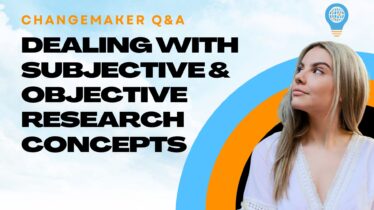Living a “Good Life” as a Changemaker: Finding the balance between doing good and feeling good
“What does it mean to live a good life?” This philosophical question carries profound significance for changemakers and those driven by the desire to make a positive impact in the world. In this podcast episode, I explored various perspectives on what constitutes a good life, considering the ethical, cultural, and societal viewpoints that influence this complex question, and shared my personal framework for conscious living that helps changemakers align their values, passions, and purpose to create a fulfilling life while contributing to meaningful social change.

The Philosophical Perspective
To properly grasp the significance of the concept of living a good life for humanity, we can turn to ancient Greek philosopher Aristotle, whose notion of eudaimonia is one of the best-known conceptions of what it takes to live a good life. Eudaimonia encompasses personal happiness, flourishing, well-being, and a sense of purpose. Aristotle argued for a eudaimonic society in which individuals are virtuous, guided by moral values like courage, justice, wisdom, and temperance.
Key characteristics of a good life in his view include:
- Virtue: Aristotle believed that eudaimonia is closely tied to moral and intellectual virtues. Virtuous actions and character traits lead to a flourishing life. These virtues include courage, wisdom, justice, and temperance.
- Rationality: Aristotle saw humans as rational beings, and he argued that rationality played a fundamental role in achieving eudaimonia. He believed that individuals must use their reason to make ethical decisions and live in accordance with their highest potential.
- Fulfilment of Human Function: Aristotle believed that every being has a unique function or purpose. For humans, this function is rationality. Eudaimonia is achieved by living in a way that fully realises and expresses this human function.
- Balance and Moderation: Aristotle emphasised the importance of finding a balanced and moderate path between extremes. For example, courage is a virtue, but recklessness and cowardice are extremes to be avoided.
- Social and Ethical Life: Eudaimonia is not solely an individual endeavour but is closely connected to social and ethical life. Aristotle believed that living in a just and harmonious community is essential for achieving eudaimonia.

There are other philosophical perspectives like utilitarianism, which emphasises maximising overall happiness, and deontology, which prioritises the inherent rightness or wrongness of actions based on moral principles, that we can use to guide us in living a good life in the ethical sense.
Cultural Approaches
Aboriginal Australians have a rich and diverse set of cultural values, practices, and traditions that shape their perception of a good life. It’s important to note that Aboriginal cultures are incredibly diverse, with hundreds of distinct groups and languages, so there is no single, uniform perspective on a good life.

However, some common elements can be found across many Aboriginal cultures:
- Connection to the Land: Aboriginal cultures have a deep spiritual and cultural connection to the land and the environment. Land is often considered the source of identity, belonging, and well-being. A good life for many Aboriginal Australians involves maintaining a harmonious relationship with the land and respecting its sacred sites.
- Cultural Heritage: Preservation and continuation of cultural practices, stories, languages, and art are essential for a good life. Passing down cultural knowledge to future generations is a fundamental aspect of well-being.
- Family and Community: Family and community play a central role in the lives of many Aboriginal Australians. Strong family bonds, extended kinship networks, and the support of the community are key elements of a fulfilling life.
- Spirituality and Connection to Ancestors: Many Aboriginal cultures have a strong spiritual dimension, and maintaining a connection with ancestors and ancestral spirits is crucial. Rituals, ceremonies, and Dreamtime stories often serve as a way to connect with the spiritual world.
- Caring for Country: A sense of responsibility and custodianship for the land, known as “Caring for Country,” is central to well-being. People belong to the land, the land doesn’t belong to people. This involves stewardship of the land, conservation efforts, and maintaining the balance of ecosystems.
- Social Equity and Justice: Many Aboriginal cultures place great importance on social equity and justice. A good life is often associated with the pursuit of fairness, social cohesion, and addressing issues of inequality and discrimination that Indigenous communities may face.
- Cultural Healing and Well-being: Some Aboriginal communities emphasise cultural healing practices to address the historical traumas and injustices that have affected their communities. Healing ceremonies and counselling, often grounded in cultural traditions, are seen as crucial to well-being.
- Self-Determination: The ability to have a say in one’s own life, make decisions for one’s community, and have a voice in issues that affect Aboriginal communities is highly valued.
Different cultures around the world have varying perceptions of what constitutes a good life. These perceptions are influenced by cultural values, practices, and traditions. Here are some examples:
Japanese Ikigai:
- In Japanese culture, “ikigai” refers to the concept of finding a reason for being, a sense of purpose in life.
- It involves the intersection of what you love, what you are good at, what the world needs, and what you can be paid for.
- The pursuit of ikigai encourages a balanced life, emphasising personal fulfilment and contribution to society.

Bhutan’s Gross National Happiness (GNH):
- Bhutan has adopted a unique approach to measuring the well-being of its citizens through GNH rather than GDP.
- GNH includes nine domains, such as psychological well-being, health, education, and cultural diversity.
- Bhutan’s culture places a strong emphasis on spiritual well-being, community, and harmony with nature.
Nordic Hygge:
- In Nordic countries, particularly Denmark, “hygge” represents a cultural emphasis on coziness, togetherness, and comfort.
- A good life is often associated with enjoying simple pleasures, like spending time with loved ones, lighting candles, and savoring comfort food.
- The focus is on creating a warm and relaxed atmosphere, which is believed to contribute to happiness and well-being.
Confucian Values in China:
- Chinese culture, heavily influenced by Confucianism, places value on family, respect for elders, and social harmony.
- A good life is often defined by fulfilling one’s roles within the family and society, showing filial piety, and maintaining strong social bonds.
- Traditional practices like ancestor veneration are integral to Chinese notions of well-being.
These examples illustrate the diversity of cultural values and practices that shape perceptions of a good life. Each culture places its unique emphasis on different aspects of well-being, and individuals within these cultures may find their own path to a fulfilling and meaningful life by aligning with these values and traditions.
Conscious Living: A “Good Life” For Changemakers
Despite differing views across different cultures or philosophical perspectives about what it means to live a good life, the one thing that appears to be similar across these perspectives is the notion that a good life is one that is good for both the individual, and their wider community, and it encompasses personal happiness and the common good. For us as changemakers, living a good life exists at the intersection of self development and social change.

The framework I use for assessing whether or not I am living a ‘good life’ is my conscious living framework. Conscious living involves being intentional and continually assessing whether one’s actions align with their internal values, passions, and purpose. To create a visual representation of this framework, imagine a Venn diagram with three overlapping circles: values, passions, and purpose.
- Values: These are the principles and ethical frameworks that guide your moral compass. They help you determine if you’re living a good life. Examples might include freedom, justice, equality, sustainability, or family. Conduct a values audit to identify your top values.
- Passions: Your passions are the activities, hobbies, or interests that bring you joy and fulfillment. Prioritise making time for these activities regularly, as they contribute to personal happiness.
- Purpose: Your purpose is your mission, the reason you believe you were put on this earth. It involves making a positive contribution to society or your community. Create a mission statement or an impact statement that reflects your purpose.
Changemakers can use this framework to evaluate their lifestyle periodically, ensuring alignment with their values, passions, and purpose. External circumstances may change, and it’s vital to adapt consciously to maintain the balance between personal happiness and meaningful societal contributions.
Listen to the full episode
Living a good life as a changemaker entails finding a harmonious balance between personal fulfilment and contributing positively to the world. While philosophical, cultural, and societal perspectives vary, a framework for conscious living helps individuals navigate this journey. By aligning values, passions, and purpose, changemakers can lead more meaningful lives, all while making a substantial impact on their communities and society at large. The pursuit of a good life, in this context, becomes an ongoing journey of self-discovery, purposeful action, and holistic well-being.




